Company:MikroTik
| Error creating thumbnail: Unable to save thumbnail to destination | |
| Error creating thumbnail: Unable to save thumbnail to destination MikroTik headquarters in Riga | |
| Type | Private |
|---|---|
| Industry |
|
| Founded | March 14, 1996 in Riga, Latvia |
| Headquarters | Riga, Latvia |
Area served | Worldwide |
Key people |
|
| Products | routers, firewalls, software (RouterOS) |
| Revenue | € 378.8 million[1][2] (2022) |
| € 108.8 million[1][2] (2022) | |
Number of employees | 343 (2020)[3] |
| Website | mikrotik.com |
MikroTik (officially SIA "Mikrotīkls") is a Latvian network equipment manufacturing company. MikroTik develops and sells wired and wireless network routers, network switches, access points, as well as operating systems and auxiliary software. The company was founded in 1996, and as of 2022, it was reported that the company employed 351 employees.[4]
With its headquarters in Riga, Latvia, MikroTik serves a diverse array of customers around the world. The company's products and services are utilized in various sectors, such as telecommunications, government agencies, educational institutions, and enterprises of all sizes.[5]
In 2022, with a value of €1.30 billion, Mikrotik was the 4th largest company in Latvia and the first private company to surpass €1 billion value in Latvia.[6][2]
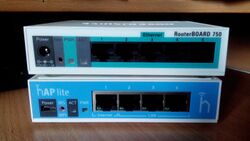
History
MikroTik was established in 1996 by founders John Tully and Arnis Riekstiņš in Riga, Latvia, developing networking software for x86 PC hardware that would develop into a product called RouterOS. The earliest versions of RouterOS were based on Linux 2.2.
In 2002, MikroTik expanded its product line by producing their own networking-focused low-power single-board computers (SBC), branded RouterBoard, that ran RouterOS. These early SBCs could be expanded and/or integrated as components of other systems, but as time passed, this RouterBoard/RouterOS platform would develop into a full line network equipment.[7][additional citation(s) needed]
Timeline
- 1997 – Release of software for x86 PC platform, called simply MikroTik Router Software, that would eventually develop into RouterOS.[8]
- 2002 – Release of RouterBoard series PCI add-in boards to be used with MikroTik x86-based PCs running RouterOS.
- 2003 – Release of RouterBoard 200, a single-board router platform, and RouterBOARD 220 with the SBC integrated into an enclosure with a 2.4 GHz wireless antenna powered by Power over ethernet (PoE). Original RouterBoard was based on the Geode CPU, but later used MIPS.
- 2012 – Release of Cloud Core Router (CCR) 1000-series, using Tilera's TILE-Gx many-core CPUs. Tilera-base CCRs would eventually be released with up to 72-cores at 1 GHz.
- 2022 – Release of CCR 2000-series network routers using ARM64-architecture CPUs and featuring 100GbE capability in the CCR2216. Also, a return to PC add-in boards with the CCR2004-1G-2XS-PCIe.
Products
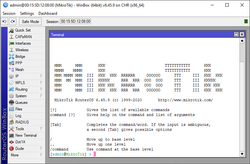
MikroTik's products mainly comprises two distinct product lines. The first is MikroTik RouterOS, an operating system for routers, which is built on the Debian GNU/Linux kernel. The second is MikroTik RouterBOARD, a line of products that includes various types of ethernet routers and switches and outdoor wireless systems.
RouterOS
MikroTik RouterOS is an operating system based on the Debian GNU/Linux kernel, specifically designed for routers. It is installed on the company's produced networking hardware - RouterBOARD, as well as on standard x86 type computers, enabling these devices to fulfill router functions. Developed with Internet Service Providers (ISPs) in mind, RouterOS encompasses all the essential features for network management and Internet connectivity, including routing, firewall, bandwidth management, wireless access point functionalities, backhaul link, hotspot gateway, and VPN server capabilities.
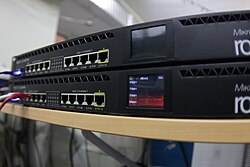
Communication with this OS is done mainly via Winbox, which provides a graphical user interface with the RouterOS installed on the network router. Winbox facilitates device configuration and monitoring. RouterOS also allows access through FTP, Telnet, serial console, API, mobile application, and SSH connections.
RouterOS supports numerous applications utilized by internet service providers, such as OSPF, BGP, and Multiprotocol Label Switching (VPLS/MPLS). It supports both Internet Protocol versions IPv4 and IPv6 and provides support for almost all network interfaces.
The release dates of major RouterOS versions are as follows:
- Version 7: December 2021
- Version 6: November 2012
- Version 5: March 2010
- Version 4: October 2009
- Version 3: January 2008
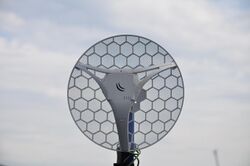
Roof-top LTE directional antenna LHG LTE6 kit
RouterBOARD
The company markets its network hardware under the name RouterBOARD (RB), ensuring full compatibility with the RouterOS operating system. The RouterBOARD line, in conjunction with RouterOS, is sold to small to medium wireless internet service providers, typically offering broadband wireless access in rural and remote areas. The product line includes assembled SOHO routers, indoor and outdoor wireless 802.11 MIMO and TDMA devices, as well as caseless PCB routers for the creation of customized solutions.
Wireless antennas
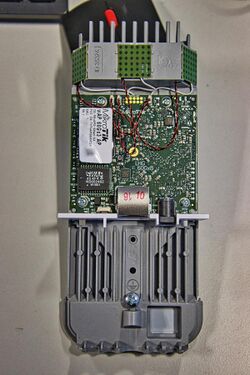
MikroTik develops a variety of wireless antennas designed for different use-cases. These include sector antennas, dish antennas, and omni antennas, each offering unique coverage patterns and distance capabilities for outdoor wireless connectivity.
Access Points
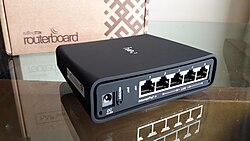
MikroTik's access points offer both indoor and outdoor models, with options for different frequency bands and throughput capacities such as 60 GHz wireless systems, 802.11a/b/g/n/ac, 2G, 3G, 4G (LTE) and 5G support.[9]
Ethernet routers
From small office routers to high-performance routers for ISPs, MikroTik develops solutions for various network sizes and complexities.
Network switches
Mikrotik also develops switches, including cloud router switches and cloud smart switches. These devices provide numerous ports for network expansion and come with features like VLAN, QoS, and port mirroring.
Product vulnerabilities
On 23 May 2018, Cisco Talos Intelligence Group reported that some MikroTik devices were found vulnerable to the VPNFilter malware.[10][11][12]
RouterOS through 6.42 allows unauthenticated remote attackers to read arbitrary files and remote authenticated attackers to write arbitrary files due to a directory traversal vulnerability in the WinBox interface.[13][14][15]
Meris
Beginning in June 2021, a botnet composed of unprotected Mikrotik devices created huge volumes of application-layer traffic using HTTP pipelining, resulting in DDOS. The net was named Mēris (or Meris) by Qrator. Yandex reported attacks beginning August 4, 2021 (over 5 million requests per second) with a massive attack on 5 September 2021 reaching almost 22 million RPS (requests per second). Cloudflare acknowledged an attack at over 17 million RPS in July 2021.[citation needed]
FOISted
In June 2022, Margin Research disclosed the FOISted vulnerability[16] allowing an administrator on a device to gain "super-admin" access that would permit exploitation of the device for command/control redirection or DDOS attacks. The exploit was patched in the RouterOS version released in October 2022.[17]
References
- ↑ 1.0 1.1 'Mikrotīkls' apgrozījums sasniedzis 374,6 milj. eiro, https://www.delfi.lv/bizness/tehnologijas/mikrotikls-apgrozijums-sasniedzis-374-6-milj-eiro-sogad-prognoze-kritumu.d?id=54897068
- ↑ 2.0 2.1 2.2 "MIKROTĪKLS, SIA | Top101.lv". https://top101.lv/company/118/?ref=top.
- ↑ Mikrotikls SIA Company Profile Riga, Latvia Competitors, Financials & Contacts - Dun & Bradstreet, Dun & Bradstreet, https://www.dnb.com/business-directory/company-profiles.mikrotikls_sia.9361593c51f660c4fd6abcaddab5c37f.html
- ↑ "Mikrotīkls, SIA" (in lv). https://www.firmas.lv/lv/uznemumi/mikrotikls/40003286799.
- ↑ "MikroTik becomes a FICIL member" (in en-GB). 2021-05-20. https://www.ficil.lv/2021/05/20/mikrotik-becomes-a-ficil-member/.
- ↑ ""Mikrotīkls" kā pirmais privātuzņēmums Latvijā pārsniedzis miljarda eiro vērtību". https://www.lsm.lv/raksts/zinas/ekonomika/mikrotikls-ka-pirmais-privatuznemums-latvija-parsniedzis-miljarda-eiro-vertibu.a431479/.
- ↑ "MikroTik - About us". MikroTik. https://mikrotik.com/aboutus.
- ↑ "MikroTik Software". http://mikrotik.com/.
- ↑ "MikroTik 2022 product catalog". https://mikrotik.com/download/pdf/MikroTik_2022.pdf.
- ↑ "New VPNFilter malware targets at least 500K networking devices worldwide". Talos Threat Source Newsletter. 2018-05-23. https://blog.talosintelligence.com/2018/05/VPNFilter.html.
- ↑ Lucero II, Louis (2018-05-27). "F.B.I.'s Urgent Request: Reboot Your Router to Stop Russia-Linked Malware". The New York Times. https://www.nytimes.com/2018/05/27/technology/router-fbi-reboot-malware.html.
- ↑ Godin, Dan (2018-05-23). "Hackers infect 500,000 consumer routers all over the world with malware". Ars Technica. https://arstechnica.com/information-technology/2018/05/hackers-infect-500000-consumer-routers-all-over-the-world-with-malware/. Retrieved 2019-04-21.
- ↑ "CVE-2018-14847 winbox vulnerability" (in en). https://blog.mikrotik.com/security/winbox-vulnerability.html.
- ↑ "CVE-2018-14847 winbox vulnerability" (in en). https://blog.mikrotik.com/security/new-exploit-for-mikrotik-router-winbox-vulnerability.html.
- ↑ "CVE-2018-14847". https://nvd.nist.gov/vuln/detail/cve-2018-14847.
- ↑ ""Critical MikroTik RouterOS Vulnerability Exposes Over Half a Million Devices to Hacking"". https://thehackernews.com/2023/07/critical-mikrotik-routeros.html.
- ↑ "CVE-2023-30799". https://nvd.nist.gov/vuln/detail/cve-2023-30799.
External links
- Company website (in English)
 |
